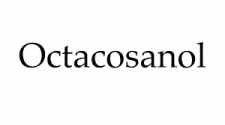Octacosanol Supplement Information - Bodybuilding Benefits

Open your mind to the various supplements available today
Octacosanol has potential as a dietary supplement, especially when incorporated in high-fat diets, but its ergogenic effects have not been confirmed. The octacosanol contained in supplements is extracted
from wheat-germ oil. It is also a constituent of plant waxes, including green blades of wheat and carnauba, as well as beeswax.
In animal experiments, octacosanol has demonstrated the ability to affect lipid metabolism by decreasing the level of serum tria-cylglycerols, stimulating the oxidation rate of fatty acids in muscle and
suppressing lipid accumulation in tissues. In particular, octacosanol has been shown to reduce peripheral adipose-tissue weight. In a recent study, octacosanol was named as one of the contributors to the
lipid lowering effect of Chinese beeswax. Some studies indicate that octacosanol may improve cardiovascular performance.
Octacosanol is not known to have any direct anabolic or anticatabolic effects on muscle tissue, but may indirectly play a role in muscle and strength development by acting on the central nervous system
(CNS). For those of us curious about performance, data exist showing octacosanol does interact with the nervous system in a positive manner. As far as your performance in the gym is concerned, if you
increase the efficiency of your nervous system, you can facilitate strength production and influence the growth response by activating more muscle fibers during a given lift. The CNS is an incredibly
powerful trigger for growth and strength increases. For example, certain athletes, especially powerlifters and Olympic weightlifters, are able to gain huge amounts of strength without gaining any weight
(a big concern in sports that utilize weight-class categories). One factor in this strength gain is thought to be the positive adaptations made by the nervous system. Here's where octacosanol may come
into play.
Scientists have theorized octacosanol may improve neuromuscular function by stabilizing nerve-cell membranes and improving oxygen transport. The studies, however, are not solid at this time. Some show
increases in grip strength, reaction speed, and endurance. Others show no changes in performance. One interesting aspect of this argument is that Russian scientists believe the oxygen transport benefits
were overemphasized by their American counterparts, and the real use for octacosanol is in improving reaction time. A little Cold War competition in the lab? Perhaps.
To see if octacosanol can work for you, try it during a heavy training period when you're doing basic exercises such as bench presses, squats and deadlifts. From the scientific literature, it's apparent that
long-term supplementation (more than six weeks) is required. Dosages range from four to six milliliters a day. If it does have positive effects, you should feel some slight changes in how powerfully you can
press the weights. You might even recover a bit quicker between training sessions.